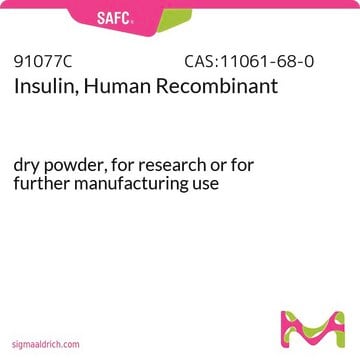MCF7/LetR-1
16022524, human breast, Polygonal epithelia
Sign Into View Organizational & Contract Pricing
All Photos(1)
About This Item
UNSPSC Code:
41106514
Recommended Products
product name
MCF7/LetR-1, from human breast, 16022524
biological source
human breast
growth mode
Adherent
morphology
Polygonal epithelia
technique(s)
cell culture | mammalian: suitable
shipped in
dry ice
storage temp.
−196°C
General description
This breast cancer cell line resistant to the aromatase inhibitor letrozole. Oestrogen receptor positive. It is progesterone receptor positive when grown in medium without letrozole
Cell Line Description
The MCF7/LetR-1 Cell Line was developed as a model of resistance to anti-cancer treatment with aromatase inhibitors.
Letrozole-resistant cell lines were established from MCF-7 cells grown in medium with 10% NCS and 10-7 M testosterone. A culture of MCF-7 cells were treated with 10-6 M letrozole for one week, trypsinized and seeded in serial dilutions in 24-well plates. Single colonies were transferred to new wells and gradually expanded in medium with letrozole. After ~2–3 months, the isolated colonies gave rise to letrozole-resistant cell lines, which could be grown in letrozole-containing medium with a weekly split ratio of ~1:25. The MCF-7 cell line was authenticated in January 2014 by DNA profiling using short tandem repeat loci and found to be matching the genetic profile reported for the MCF-7 cell line.
Letrozole-resistant cell lines were established from MCF-7 cells grown in medium with 10% NCS and 10-7 M testosterone. A culture of MCF-7 cells were treated with 10-6 M letrozole for one week, trypsinized and seeded in serial dilutions in 24-well plates. Single colonies were transferred to new wells and gradually expanded in medium with letrozole. After ~2–3 months, the isolated colonies gave rise to letrozole-resistant cell lines, which could be grown in letrozole-containing medium with a weekly split ratio of ~1:25. The MCF-7 cell line was authenticated in January 2014 by DNA profiling using short tandem repeat loci and found to be matching the genetic profile reported for the MCF-7 cell line.
Culture Medium
Phenol red free DMEM:F12 (1:1) (D6434) + 10% Newborn Calf Serum(NBCS) (N4637) + 2.5 mM Ala-Gln (G8541) + 6 ng/ ml Insulin (I9278), 0.1 uM testosterone and 1 uM letrozole
Subculture Routine
Split sub-confluent cultures (70-80%) 1:3 to 1:6 i.e. seeding at 2-4 x 10, 000 cells/cm² using 0.05% trypsin or trypsin or trypsin/EDTA; 5% CO2; 37°C.
Other Notes
Cultures from PHE Culture Collections and supplied by Sigma are for research purposes only. Enquiries regarding the commercial use of a cell line are referred to the depositor of the cell line. Some cell lines have additional special release conditions such as the requirement for a material transfer agreement to be completed by the potential recipient prior to the supply of the cell line. Please view the Terms & Conditions of Supply for more information.
Citation
If use of this culture results in a scientific publication, it should be cited in the publication as: MCF7/LetR-1 (ECACC 16022524)
Disclaimer
This cell line has special release conditions: Commercial organisations are required to complete the ′Cell Line Release Authorisation for Research Use in Commercial Organisations′ release conditions form.
Certificates of Analysis (COA)
Search for Certificates of Analysis (COA) by entering the products Lot/Batch Number. Lot and Batch Numbers can be found on a product’s label following the words ‘Lot’ or ‘Batch’.
Already Own This Product?
Find documentation for the products that you have recently purchased in the Document Library.
Our team of scientists has experience in all areas of research including Life Science, Material Science, Chemical Synthesis, Chromatography, Analytical and many others.
Contact Technical Service






